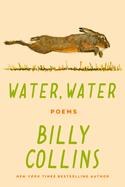
 In Water, Water, a collection of new poems, former U.S. Poet Laureate Billy Collins applies his signature wit and whimsy to everyday situations: waiting at the doctor's office, playing cards on a winter's night, reading the guest book at a lakeside cottage. In examining these ordinary moments (sometimes minutely), Collins holds them up to the light, revealing facets both absurd and beautiful: the exquisite torture (to some) of an all-violin jazz band; the "rough armadillo plates" of a pineapple; or the way that joy, personified, seems "down to earth,/ like a girl getting off a bus with a suitcase."
In Water, Water, a collection of new poems, former U.S. Poet Laureate Billy Collins applies his signature wit and whimsy to everyday situations: waiting at the doctor's office, playing cards on a winter's night, reading the guest book at a lakeside cottage. In examining these ordinary moments (sometimes minutely), Collins holds them up to the light, revealing facets both absurd and beautiful: the exquisite torture (to some) of an all-violin jazz band; the "rough armadillo plates" of a pineapple; or the way that joy, personified, seems "down to earth,/ like a girl getting off a bus with a suitcase."
Throughout his career, Collins (Aimless Love; Whale Day; Sailing Alone Around the Room) has explored the beauties, amusements, and pathos of ordinary life: his poems are often about small things, at least on the surface. But his sly genius lies in turning the commonplace at an angle, allowing readers to appreciate their hidden depths. A solitary breakfast after an argument becomes a meditation on not only the history of art, but complex stories of the people portrayed in famous paintings; a reflection on illuminated medieval manuscripts leads the poet to contemplate the benefits of modernity, including his car and his wife (both beloved). Similarly, Collins's continuing tour through the dailiness of life is both practical and mischievous, as he considers the poetic practice of addressing the heart (or other organs), the challenges of lesson planning as related to orange trees, and the experience of hearing an Italian astronaut read Emily Dickinson's poetry aloud from space.
In "The Monet Conundrum," Collins ponders a question that may well occur to veteran writers: "Is every one of these poems/ different from the others," he asks, "or are they all the same poem,/ haystack after haystack/ at different times of day,/ different shadows and shades of hay?" While the poems in Water, Water certainly present variations on a few themes--marriage, mortality, jazz, and Emily Dickinson, among others--each one is quietly, slyly distinct, pondering such existential phenomena as the anniversary of a loved one's death and mulling over the idea of the afterlife on a Sunday drive. Although Collins frequently waxes philosophical, musing on constellations, ancient deities, and the very nature of existence, his poetry is at its best when capturing a particular shade of memory--fleeting, unexpected, luminous with meaning--like the one in "Daydream," when a blaze of multicolored azaleas reminds the poet of a stolen moment with the neighbor's "tall daughter/ whose hand you once held in the dark." --Katie Noah Gibson, blogger at Cakes, Tea and Dreams
Shelf Talker: Billy Collins applies his signature wit and whimsy to ordinary situations, revealing their hidden absurdities and depths.

